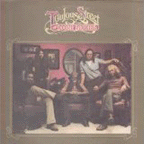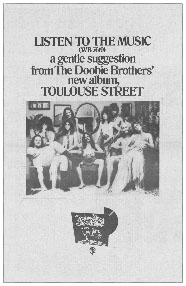![]()
  |

Toulouse Street
The Doobie Brothers
Warner 2634
Released: July 1972
Chart Peak: #21
Weeks Charted: 119
Certified Platinum: 10/13/86

 With their second album the Doobie Brothers have made the big jump into the majors. If there were such a thing as futures in Doobie Bros. T-shirts, I would rush out and pick up a coupla gross. This band is playing up there in the same league as, say, the Allman Brothers. Unlike the original membership of the latter fraternal organization, the Doobies are brothers in name and spirit only. Like the Allmans, they emit mellow yet rocking melodies featuring lacy guitar playing and a contagious back beat -- you can't lose it. Theirs is a delicately textured sound, even at its most raucous, resting on the tensile interplay of acoustic and electric instruments as well as some flawlessly woven vocal harmonies.
With their second album the Doobie Brothers have made the big jump into the majors. If there were such a thing as futures in Doobie Bros. T-shirts, I would rush out and pick up a coupla gross. This band is playing up there in the same league as, say, the Allman Brothers. Unlike the original membership of the latter fraternal organization, the Doobies are brothers in name and spirit only. Like the Allmans, they emit mellow yet rocking melodies featuring lacy guitar playing and a contagious back beat -- you can't lose it. Theirs is a delicately textured sound, even at its most raucous, resting on the tensile interplay of acoustic and electric instruments as well as some flawlessly woven vocal harmonies.
The emergence into the front ranks of the euphoniously titled Doobies should come as no surprise to anyone who has heard their first album, released early last year. One side consisted of variations on a theme, five explorations of the possibilities of acoustical boogie music using the same instrumentation with similar motifs and lyrical imagery. Though their attempts fell short of brilliance, lead guitarist Tom Johnston and rhythm guitarist Pat Simmons were provided with a framework in which to display the flowing symmetry of their blues-tinged runs. The albums' second side delved into electric music with uneven though intriguing results.
 Click image for larger view. |
If 1972 has brought little else to Rock, it has revived the travelin' song and, as a corollary, tunes about specific destinations and locales. A partial list would have to include John Lennon's "New York City," Paul Simon's "Paranoia Blues" and Elton John's "Mona Lisas and Mad Hatters" (both also about New York), the Kinks' "Celluloid Heroes" and Neil Young's "Heart of Gold" (a pair centered around Hollywood), and Young's "Alabama" and Steve Stills' "Colorado." And who can forget the Eagles' "Take It Easy" with it passing yet immortal mention of Tuscon, Arizona? The Doobies add three fine songs to the genre with their piano-driven "Rockin' Down the Highway," the reggae-propelled "Mamaloi" ("got to get back to Jamaica") and the title track "Toulouse Street" about bad times in New Orleans, featuring some harmonies reminiscent of Paul Stookey and Peter Yarrow during PP&M's prime.
The Doobies end the first side of the album with a lush R&B rendition of Seals and Crofts' "Cotton Mouth." Again faithful to the dialectic, the Brothers round out the other side with a desperado blues called "Snake Man." Between those two poles, they show off their virtuosity with a tight version of Sonny Boy Williamson's "Don't Start Me to Talkin'," a dynamically expanded "Jesus is Just Alright," "White Sun," an example of the acoustic style they employed on their debut album, and "Disciple," a long cut which gives the band a chance to work out, loosing on an unsuspecting world Johnston and Simmons' fleet flying fingers.
In a medium where words lose their value as fast as Nixon dollars, it's hard to convey what's good about the Doobies without resorting to exaggeration. Applying the ultimate criteria of whether a record is worth three, four or five hard-earned bills out of your pocket, this is one of the year's dozen albums that pass the test without reservation. With credentials like that, there's no need to exaggerate.
- Steve Ditlea, Rolling Stone, 10-12-72.
Bonus Reviews!
You let one Three Dog Night into the musical neighborhood and the next thing you know, nobody's musical flowerbed is safe. Record executives are just as eager to copy success as TV executives are (you've no doubt noticed the Archie Bunker look-alike explosion of the tube). So be it. The Doobie Brothers have just as much style as Three Dog Night (about seven on a scale of 100), they write most of their own stuff, and they all play instruments -- and Pat Simmons' "Toulouse Street" isn't a bad song, actually -- so why shouldn't they also cash in on the fact that our national appetite for blandness seems limitless? At least AM radio listeners will hear Simmons play better guitar than they're accustomed to. I suppose I can abide the enlargement of the pack, but I do wish they wouldn't shed all over my favorite speakers.
- Noel Coppage, Stereo Review, 5/73.
The Doobie Brothers' music pivots on an uncontrived musical lightness and a refreshing amount of sheer vitality and buoyant engaging spirits. The overall feel is slightly countrified, good time music. Seemingly they play with effortless precision and undiminished enthusiasm. Prime sources of enjoyment are "Listen to the Music," "Jesus Is Just Alright" and "Mamaloi."
- Billboard, 1972.
After a promising but ill-formed debut, the Doobie Brothers returned with Toulouse Street, a better-written and more energetically performed effort that became a platinum record on the strength of its catchy single, "Listen to the Music." * * * * *
- Stephen Thomas Erlewine, The All-Music Guide to Rock, 1995.
Toulouse Street is the strongest of the pre-Michael McDonald Doobie Brothers albums. Though it didn't include the biggest hits, it did have a nice balance of hard rock a la "Rockin' Down the Highway" and folksiness in the better-known version of the Byrds' "Jesus Is Just Alright." * * * 1/2
- Gil Asakawa, Musichound Rock: The Essential Album Guide, 1996.
![]() Reader's Comments
Reader's Comments
No comments so far, be the first to comment.